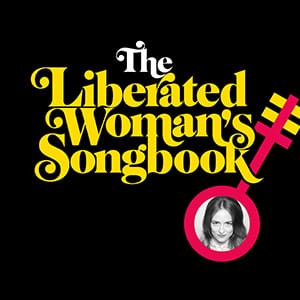
There is an actual Liberated Woman’s Songbook. Jerry Silverman gathered 77 folk songs concerning women’s struggles in America for people to sing along to in solidarity in the turbulent year 1971. The songs chronologically address women’s social and economic concerns from the early 19th century to 1970. The fact that the original publication came out more than 50 years ago and is still deemed relevant today suggests not much has changed since then—or even since 1830, when the first song was written.
Dawn Landes found a copy of the volume in a thrift store in 2020. Landes found solace and hope in the book’s contents, especially after the Supreme Court overturned Roe v Wade in 2022. Since then, Landes has created a theater piece based on the material and performed with a varied group of others on different stages at a host of venues. She now has recorded the Songbook, an 11-song collection that traces the history of the women’s rights movement in America.
The Liberated Woman’s Songbook begins with the stout ballad “Hard Is the Fortune of All Womankind” (1830). The lyrics are strong, simple, and clear. From the first verse (“She’s always controlled, she’s always confined / Controlled by her parents until she’s a wife / A slave to her husband the rest of her life”) to the last line, we learn that a woman’s life does not belong to herself. She is only here to serve others. The staunch language suggests the singer does not accept her fate. Dawn Landes has a somewhat delicate voice, which adds to the radical nature of the song. It works like a lead pipe covered with silk. What may seem soft on the surface hides a resolute inner strength. By the time the track has ended, one can intuit that the complaint has become a battle cry of protest.
Landes sings lead and also plays guitar and organ. She is backed up by Josh Kaufman on a multitude of instruments (guitars, keys, drums, bass, mandolin, vibes, percussion), JT Bates on drums, Annie Nero on upright bass, and assorted others on accordion, flute, horns, fiddle, and vocals on individual tracks. There is a communal aspect to the presentation. The participants frequently sing and play together as one.
The other three songs from the 19th century offer a mix of forward-looking hopefulness (“One Hundred Years (1852)) to past wailings (“The Housewife’s Lament” (1866)) to the current struggle for equal rights (“Keep Woman in Her Sphere” (1882)). Dawn Landes and company articulate the words folk style. The music is meant to inspire.
The 20th-century selections outline many of the significant issues of the time, especially related to labor safety issues and union concerns. “The Factory Girl” (1908), “Bread and Roses” (1912). “The Mill Mother’s Lament” (1929), “Cotton Mill Girls” (1930″), and “What Side Are You On” (1931) all emerged from specific industries, strikes, and protests. There’s a martial flavor to much of the material. One can easily imagine them being sung at union rallies and political gatherings. The songs note both the existing hard times and the desire for a better life in the future. Landes resolutely leads her accompanists into the combat for women’s lives, liberty, and the pursuit of happiness.
The last two cuts from 1970 present a broader perspective on the situation of women. “There was a Young Woman Who Swallowed a Lie” and “Liberation, Now!” call for full equality in the name of humanity. “We’re more than mothers and wives with secondhand lives,” Landes sings. The earlier songs call for women’s rights under the guise that treating women as equals would make them better mothers and wives. More than 100 years later, the songs note this is not enough. Women’s rights are the unalienable ones we all share. Anything else is inherently wrong.


![Call for Papers: All Things Reconsidered [MUSIC] May-August 2024](https://www.popmatters.com/wp-content/uploads/2024/04/all-things-reconsidered-call-music-may-2024-720x380.jpg)



